Ilkeston Circuit, Derbyshire
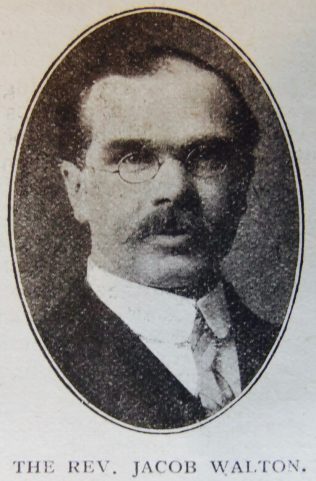
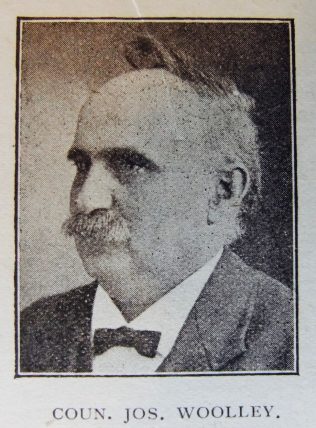
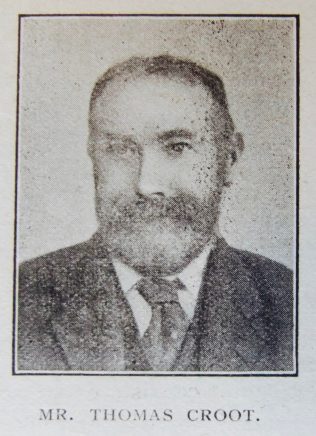
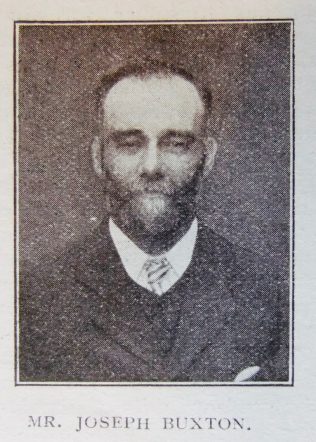
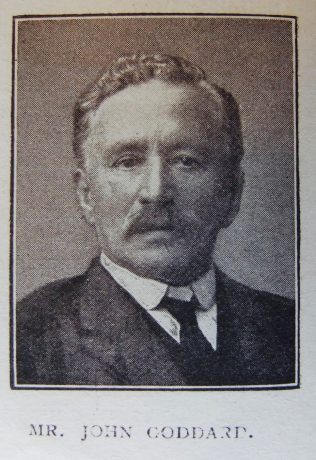

Transcription of Article in the Christian Messenger by Rev. Jacob Walton
ILKESTON town is equi-distant between Derby and the city of Nottingham. A ride of twenty minutes in the railway train will take you to either centre. The town rests on a ridge of country shaped like the backbone of a herring. At the base of the ridge running through low lying country is the sluggish stream called the “Erewash,” which gives to the valley its name. With the development of the coal industry, together with lace, glove and hosiery factories, and iron works, the population of the town has grown from one thousand in 1816 to thirty-four thousand five hundred at the last census. Ilkeston is now a town, modern in its appointments, progressive in its spirit, and thoroughly democratic in the management of public affairs. The mayoralty has been held principally by Free Churchmen, and on three occasions a Primitive Methodist has occupied this high office in the persons of Alderman Samuel Shaw and Councillor Joseph Woolley. The Free Churches are fairly strong; if we count buildings, big and little there are fourteen; three of these are Primitive Methodist. The Anglicans have five influential centres of activity. Friendliness and mutual respect express the relationship between the two sections, the Established and the Free Church.
Primitive Methodism entered Ilkeston in 1816. Sarah Kirkland, evangelist and first female travelling preacher, and George Herod, the first home missionary, were the pioneers of our Church. The Nottingham Circuit plan for 1817 shows that Ilkeston was supplied with preachers. In 1883 (Note:- This date must be ‘a typo’ in the article.) it became a branch of Nottingham; by June, 1834, Ilkeston was the recognized head of a circuit which included such distant places as Codnor Park and Kimberley. The stationing of the Rev. W. Carthy in 1849 led to a forward movement which resulted in substantial material development. The present church in Bath Street, the head of the circuit, was built by him in 1852. At six other places Mr. Carthy left tangible proof of his administrative ability and activity. The circuit owes much to his energy and foresight. ‘The site he selected for the head Church is now on the main thoroughfare, in the heart of the town, and makes an admirable centre for religious work.
Since the formation of the circuit steady progress has been made. The year 1882 saw a division of the circuit, and Kimberley became the head of a new circuit. To-day the circuit consists of six societies, three of which are in the town; and the other three, Heanor, Langley and Stanley Common are within easy reach. The total membership is just over four hundred, and one minister is maintained. The circuit is rich in young people and ought in the near future to make rapid progress. The day should not be far distant when additional ministerial assistance on the Heanor and Langley side will add materially to the resources and status of the station.
Bath Street Church has a membership of one hundred and thirty-six. Coalminers, tradesmen and factory workers rub shoulders together in the service of the Church.
Since the year 1852 the society has had the advantage of a central position, and through the years has done good work. It was in this church that the Rev. James Flanagan was led to give his heart to God; here he began his first essay in Christian service; from Ilkeston he started on his notable career as evangelist, preacher and lecturer. In this connection James Richards should not be forgotten. He took Flanagan by the hand, and acted the part of Barnabas. He was a godly coal-miner who kept the faith throughout a long and checkered life, and then greeted the unseen with “glory” on his lips.
For many years Mr. Stephen Keeling was one of the pillars of the church, and a tablet in the church building is testimony of the high respect in which he was held.
The oldest local preacher is Mr. Thomas Croot, who for fifty years has preached with Methodist fervour and conviction. He is a stalwart, loyal to the traditions of his Church, generous in his support and a worshipper who is rarely absent from his pew. Behind him sits Mr. Richard Pepper, another veteran of great loyalty and service.
The important posts of Church Treasurer and Society Steward are filled by Mr. W.H. Huckerby and Mr. G.H. Broughton respectively.
The Sunday SchooI Department is organized in three sections – the Primary, the Intermediate and the Senior or Young People’s Institute. Each section is successful. The Seniors meet in the church in the afternoon. The average attendance is about one hundred. A valuable aid in the Institute meeting on a Sunday afternoon is the music of an efficient string band under the conductorship of Mr. Joseph Smith. The Bath Street Women’s Own has the reputation of being the best in the town. Certainly its weekly meeting is well attended, and the service that this organization renders is of the utmost value. The Choir during the last three years has acquired great skill and taste in its musical attainments, and in March this year won prizes, including a first, at the Loughborough Eistedfod.
Our position as a denomination in Ilkeston can be considered satisfactory. We more than hold our own. Officials and minister play a leading part in the public life of the town. Competition from other Churches is becoming more severe. The Wesleyans, within a hundred and fifty yards of our church, have turned their fine building into a central mission. Necessity led to this step. The cause had become derelict. Their minister is now concentrating his energies on Ilkeston. But in spite of new competition, there remains a great opportunity for Primitive Methodism. Our present status is excellent, but one minister giving attention to three important churches outside Ilkeston cannot cope with the growing needs of the town. Wise statesmanship will prepare for the employment of additional ministerial aid.
In addition to the Bath Street Church, Primitive Methodism in llkeston is represented by two other societies. Nottingham Road Church has resting upon it the dew of youth. It is a church of young vigorous life. One building has to suffice for worship and service. It is packed by over three hundred scholars, morning and afternoon, and a large congregation gathers in the evening. There is a fine Christian Endeavour meeting under the conductorship of Mr. G. Dexter and Mr. J.H. Sentance. Mr. W. Prentice is the Financial Organiser of the church. Some day a new place of worship will be erected on the adjoining site, then the self-sacrificing labours of the present energetic band of workers will have been rewarded. Cotmanhay is a small society at the far end of the town that bravely keeps the flag flying. There is not much prospect of future development here unless the town extends beyond the present limits of population. The Gambles and the Wheatleys have rendered yeoman service here.
Outside Ilkeston we have societies at Heanor, Langley and Stanley Common. In the townships of Heanor and Langley there will be a population of twenty thousand people. Heanor Society dates back to 1849, when the old Tag Hill Chapel was built. In 1887 the present Park Street Church was erected. No debt remains. Unfortunately no provision was made for future extension; but the present Trustees, quite undaunted have purchased a first-class site on the main thoroughfare in readiness for the day when the church can arise and build. The lack of our society at Heanor is sufficient accommodation for the scholars, but the best under the circumstances is done by a resourceful and energetic band of workers. When the time of the Sunday school Anniversary comes round, the Town Hall is engaged and a great crowd of people gather to listen to the children. Apart from the school premises, good use is made of the church building for Sunday school purposes. The Primaries are are accommodated at 1.30 in the church and the Seniors at 3 o’clock hold their session. Mr. William Walker, Senr., is the School Superintendent. Mr. C. Mettam, F.R.G.S., is the President of the Young People’s Institute.
Heanor Society is thoroughly progressive. A good congregation is maintained. Mr. T.E. Williams is Society Steward, and Mr. W. Bagguley for many years now has given splendid service as voluntary organist.
In the town of Heanor with its large population, there is only one resident Free Church minister – a junior Wesleyan minister. The surprising thing is that neither the Baptists nor the Congregationalists have a minister. It is equally surprising that Methodism can only muster one minister. No charge of redundancy could be preferred if a Primitive Methodist minister were stationed here. There is a first-class opening for our Church in the Heanor and Langley district.
Langley is an older society than Heanor. The date of beginning is 1828. Francis Purdy was the founder. The school chapel of to-day – built in 1892 – stands of a first-class corner site with plenty of room for future extension. The membership is not large – about sixty; but it is both resourceful and energetic. Last year a new pipe organ was installed at a cost of about £600; only £150 remains as debt, and very soon this will be liquidated. The Rev. German Hunt entered the ministry from the Langley Society; and Langley, through the years has given proof of its esteem by inviting Mr. Hunt to be the preacher of the school sermons. Our friend has served in this capacity for forty years without a break. This surely is a record. Mr. Hunt is always certain of a hearty welcome both at Langlev and in the clrcuit. In Mr. Joseph Buxton the society possesses a choirmaster whose hobby is music, and who, with great devotion, worthily continues the tradition of a family that from earliest days has been identified with the Church. No account of Langley would be complete without mention of the name of John Gdddard. Mr. Goddard has served his Church as a local preacher for fifty-four years. The Rev. James Flanagan once described him as “the Tag Hill orator.” In his prime he was in great demand for both pulpit and platform. The Derbyshire miners owe their Miners’ Union to Mr. Goddard’s personal advocacy and steadfastness in a time of grave crisis. Though the years tell their tale of wear and tear, Mr. Goddard can still stand within the gates of God’s House, Sunday morning as well as evening. The Langley Society promises to outstrip its past record. There are possibilities of development. There are families in the Church whose devotion is a guarantee of greater days.
Stanley Common is the birthplace of the family of Dann. The Rev. J. Dann, a faithful minister of the Church, and Mr. W. Dann, of Clay Cross, a veteran in Christian service, received their first religious impressions in this part of Derbyshire. Another member of the family Mr. C. Dann, has remained in the village of his birth, and has given valued service in a worthy and capable way, as Society Steward and Trust Secretary.
The society is staffed by young men of warm loyalty, and though the Sunday school here is comparatively small, yet up-to-date methods of work are applied. The Institute room, recently erected, enables the workers to have a separate Primary Department. A recent development at Stanley Common is the formation of a Women’s Own organisation, and good meetings are being held.
The burden of debt on the property in the circuit is very light. Each Trust Estate is in a sound financial position. The commercial value of the Bath Street block of property is very substantial. Nottingham Road a few years ago was burdened by a debt of over £700; but this has been reduced to £300. A new Trust of energetic manhood has been formed, and steps are now being taken for the complete reduction of the debt. Heanor Trust is out of debt except for the liability incurred by the purchase of the new site. Langley and Stanley Common have no financial anxieties.
Christian Endeavour work on the station is vigorous, and at all the places, except one, a weekly Christian Endeavour meeting is held. A real interest is taken in young people and a large number of young men and women respond.
The late Rev. John H. Hemshall had two terms of very useful service at llkeston.
A fair characterisation of the official life of the station would be unfailing loyalty to the interests of the Primitive Methodist Church with a growing capacity to look at a situation from a Connexional point of view. Within recent years the circuit missionary income has been quadrupled; the Sustentation Fund claims have been readily met, and there is frank acknowledgment of the value of the ministry. Councillor J. Woolley, who occupies several prominent positions in the town, is the Circuit Steward. Mr. George Halston as Junior Steward represents the Heanor and Langley side of the circuit.
Not only is the circuit rich in its young people but it is rich in its womanhood. The women lead the way in many spheres of activity and give splendid aid. A station of this type, of course, depends very much on the voluntary service of its local preachers, and here let it be said, the men take their work with readiness and preach with general acceptance.
The llkeston Circuit has not yet come to the full limits of its possibilities. There is the opportunity and the material for greater achievements.
The spirit of holy daring will bring bigger triumphs, and Primitive Methodism will continue to contribute its quota to the advance of the Kingdom of God in this district of Derbyshire. It has made big gifts in the past and is better equipped than ever.
References
Christian Messenger 1923/305





No Comments
Add a comment about this page